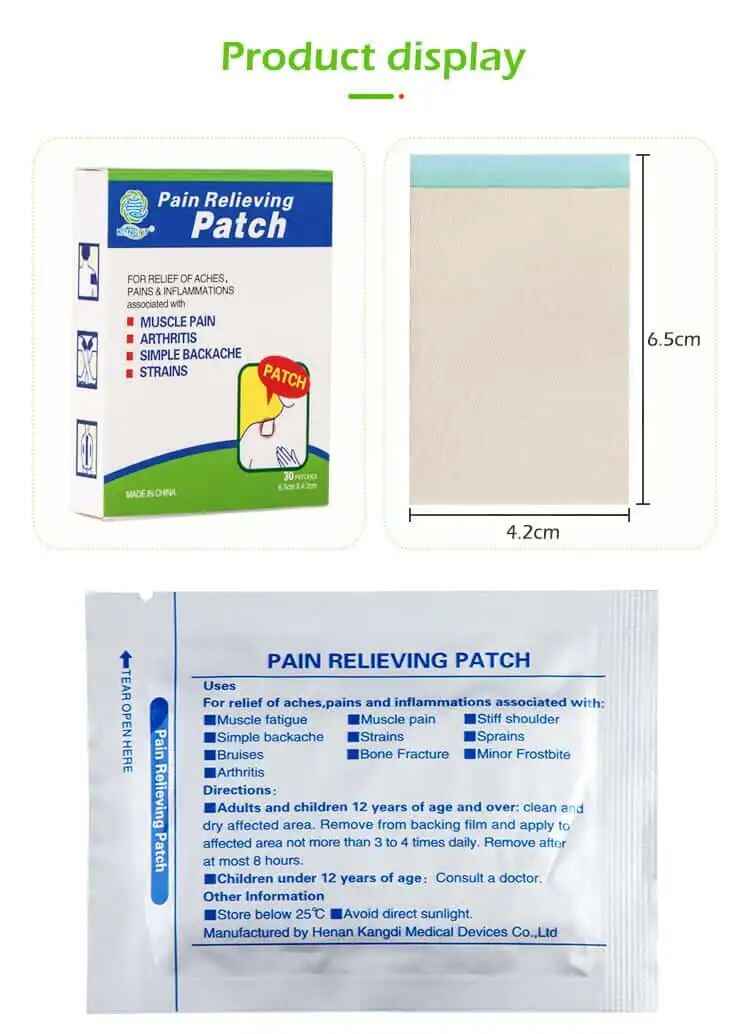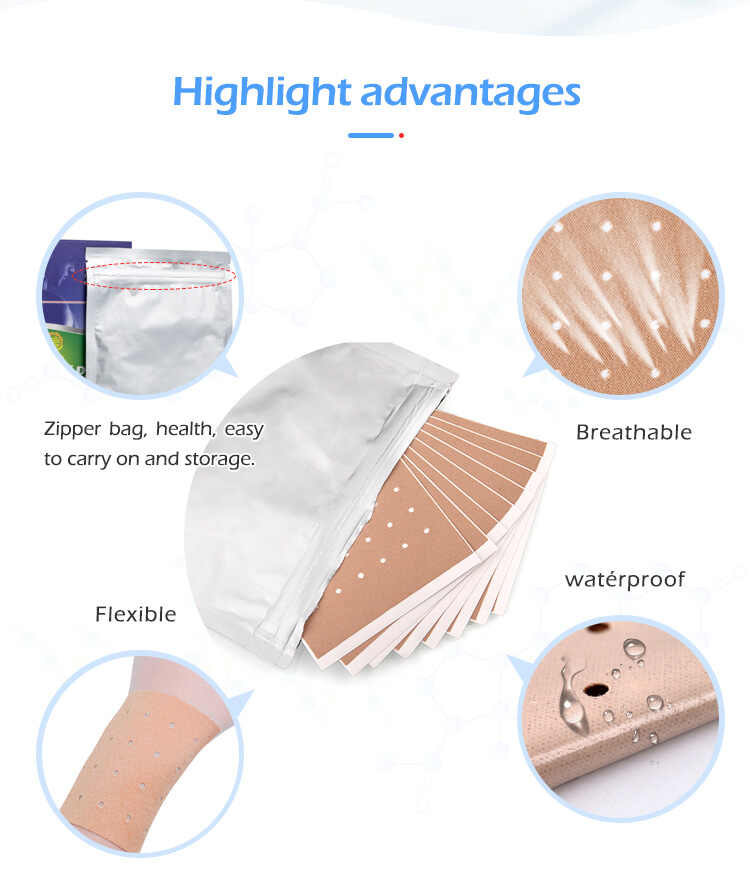What Certifications Should I Look for in a Pain Relief Gel Patches OEM?
When partnering with a Pain Relief Gel Patches OEM, certifications are more than just formalities—they are critical indicators of product quality, safety, regulatory compliance, and business credibility. Whether you're a startup creating Custom Pain Relief Gel Patches or an established business expanding with Private Label Pain Relief Gel Patches, understanding the essential certifications is key to building a trusted and successful brand.
In this article, we’ll explore the most important certifications to look for in a Pain Relief Gel Patches Manufacturer, why they matter, and how they impact your partnership, product, and reputation in both domestic and international markets.

1. Why Certifications Matter in OEM Partnerships
OEM certifications prove that a Pain Relief Gel Patches Supplier meets rigorous standards in manufacturing, safety, and quality assurance. These certifications:
Reduce legal and compliance risks
Build consumer trust and brand credibility
Ensure consistent product quality
Open access to international markets
Simplify regulatory approval and audits
Minimize the risk of recalls or regulatory violations
In short, working with a certified Pain Relief Gel Patches Manufacturer safeguards your business on every level—from production to retail.
2. Must-Have Certifications for Pain Relief Gel Patches OEMs
a) GMP (Good Manufacturing Practice) Certification
What It Is:
A global standard ensuring products are consistently produced and controlled according to quality standards.
Why It Matters:
Ensures sanitary production conditions
Controls for contamination and consistency
Essential for FDA and international compliance
Prevents product recalls due to safety issues
What to Look For:
FDA-registered GMP facility (U.S.)
WHO-GMP or PIC/S GMP for global compliance
A GMP-certified Pain Relief Gel Patches Manufacturer demonstrates an industry-standard commitment to safe and clean production.
b) ISO 13485:2016 (Medical Device Quality Management System)
What It Is:
An international quality standard specifically for manufacturers of medical devices.
Why It Matters:
Validates strict quality control for transdermal patches
Required for CE marking in the EU
Shows robust risk management systems
Supports faster entry into regulated markets
For Private Label Pain Relief Gel Patches intended for therapeutic use, ISO 13485 compliance is essential.
c) FDA Registration (for U.S. Markets)
What It Is:
Registration with the U.S. Food and Drug Administration for over-the-counter drug products.
Why It Matters:
Required to legally sell OTC pain relief patches in the U.S.
Enables use of FDA monographs (e.g., menthol, camphor)
Critical for both custom and private label products
Ask if the Pain Relief Gel Patches OEM is listed in the FDA's Drug Establishment Registration database and whether they follow FDA monograph guidelines.
d) CE Certification (for European Markets)
What It Is:
A conformity mark showing the product meets EU health, safety, and environmental standards.
Why It Matters:
Mandatory for distribution within the European Economic Area (EEA)
Covers transdermal pain patches as Class I/IIa medical devices
Requires clinical data, risk evaluation, and product labeling compliance
A Pain Relief Gel Patches Supplier with CE certification can help your brand expand confidently into European markets.
e) MSDS (Material Safety Data Sheet)
What It Is:
A document detailing the safety, handling, and potential hazards of ingredients used.
Why It Matters:
Ensures transparency of raw materials
Protects workers and consumers from chemical risks
Often required by customs and retail partners
Helps brands demonstrate commitment to safety
Request MSDS documents for all active ingredients used in your Custom Pain Relief Gel Patches.
f) Dermatological Testing / Skin Safety Certifications
What It Is:
Independent tests to confirm that the patch is non-irritating and safe for topical use.
Why It Matters:
Demonstrates that your product won’t cause allergic reactions
Reduces customer complaints and returns
Important for products marketed as “hypoallergenic,” “gentle,” or “sensitive skin safe”
Choose a Pain Relief Gel Patches Manufacturer that provides documented test results from clinical or third-party dermatology labs.
g) Halal / Vegan / Cruelty-Free Certifications (Optional but Increasingly Valuable)
Why It Matters:
Aligns with ethical and religious consumer preferences
Boosts global market reach, especially in Southeast Asia, the Middle East, and parts of Europe
Appeals to conscious consumers seeking cruelty-free, plant-based wellness solutions
These credentials can give your Private Label Pain Relief Gel Patches a competitive advantage in niche wellness markets.
h) ISO 22716:2007 (Cosmetic GMP for Wellness-Oriented Products)
Why It Matters:
Focuses on cosmetic manufacturing standards, cleanliness, traceability, and quality
Ideal if your pain relief patch is marketed under beauty or wellness categories (e.g., spa, massage, or aromatherapy applications)
This is especially relevant for Custom Pain Relief Gel Patches that combine pain relief with soothing or luxury experiences.
3. Certifications Add Value to Your Brand
Partnering with a certified Pain Relief Gel Patches OEM boosts your brand in multiple ways:
Consumer trust: Certifications build confidence in safety and efficacy
Retail readiness: Big-box stores and e-commerce platforms prefer or require certified products
Investor confidence: Certifications signal business maturity and risk management
Marketing leverage: Highlighting certifications in product packaging and online listings adds credibility
Ultimately, certifications are not just behind-the-scenes paperwork—they are assets that increase the value and legitimacy of your entire product line.
4. How to Verify Certifications
Don’t take claims at face value. When evaluating a Pain Relief Gel Patches Manufacturer, ask for:
PDF copies of relevant certificates
Certificate expiration dates and issuing bodies
Audit reports (if available)
Registration or license numbers
Lab testing reports
You can also verify credentials via official websites such as:
5. Final Checklist for Choosing a Certified OEM
When selecting a Pain Relief Gel Patches Supplier, ensure they can provide:
✅ GMP Certification
✅ ISO 13485:2016 Compliance
✅ FDA Registration (for U.S. markets)
✅ CE Certification (for EU markets)
✅ MSDS Documentation
✅ Dermatological Testing Reports
✅ Optional certifications (Halal, Vegan, Cruelty-Free)
✅ Track record with private label or custom clients
This checklist ensures that your Custom Pain Relief Gel Patches are not only effective—but also legal, safe, and market-ready.
Related Questions and Answers
Q1: Do all OEMs need to have ISO 13485 certification?
A: If your product is categorized as a medical device, ISO 13485 is critical. For wellness-only claims, it may not be mandatory but is still highly valuable.
Q2: Can I legally sell a pain relief patch without FDA registration?
A: In the U.S., if the patch contains active drug ingredients like menthol or camphor, FDA registration is required for legal OTC sale.
Q3: What is the difference between CE and FDA certification?
A: FDA certification applies to U.S. markets; CE certification is required for Europe. Both assess safety and quality but follow different processes.
Q4: Should I care about cruelty-free or vegan certifications?
A: Yes, especially if your brand targets eco-conscious or ethical consumer markets. These credentials can influence purchasing decisions.
Q5: What happens if my supplier lacks certifications?
A: You risk non-compliance, legal penalties, poor product quality, and rejection from retail platforms and regulatory agencies.
Conclusion
Choosing a certified Pain Relief Gel Patches OEM is not optional—it's essential. These certifications ensure that your Private Label Pain Relief Gel Patches meet global quality, safety, and legal standards. They protect your customers, enhance your credibility, and support smooth entry into domestic and international markets.
When selecting a Pain Relief Gel Patches Manufacturer or Pain Relief Gel Patches Supplier, make certifications a top priority. It’s the most effective way to build a reliable brand foundation, gain a competitive edge, and avoid costly setbacks down the road.






